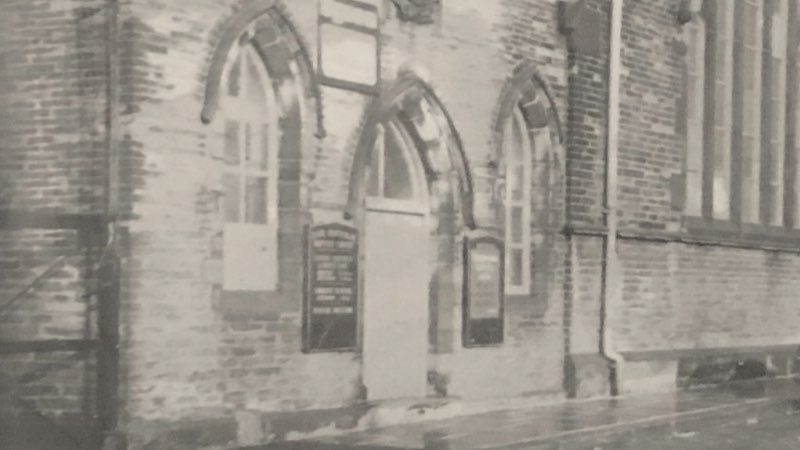
The Life And Testimony Of Susannah Harrison
Gospel Standard 1868:
Death. On Aug. 30th, 1867, aged 37, Susannah Harrison, a member of the church at Zoar Chapel, Bradford, Yorkshire.
It was in 1855 when the Lord commenced the work of grace upon her soul. She had a sister at that time who lay ill and was not expected to live. Being a scholar in the Sunday School, the superintendent, as is usual, visited her, and then conversed with her on her state as a sinner and of the all-sufficiency of Christ as a Saviour to all who feel their lost and ruined condition. Susannah, staying in the room, heard the conversation. At that time her mind was at enmity against those things. The doctor now gave no hope of her sister’s recovery, and Susannah felt in her mind a desire that she might die instead of her sister; but no sooner had the thought come to her mind than she felt she had no hope beyond the grave. This brought her into great distress of mind, and all her supposed goodness began to vanish away. She experienced great bitterness and anguish in her soul in the prospect of death, without a hope of heaven. Her sins now began to be a very heavy burden upon her mind. She commenced reading the word of God at every opportunity; but having to be at her work at six o’clock in the morning, she had not much time, still she always contrived to be up a little before that time for reading and prayer before she left home.
Her father, at this time not knowing that there was anything going on in her soul, when retiring to bed, always left his Bihle closed, and when he arose in the morning, and she had gone to her work, he always found it open lying upon the table. This caused him to suspect there was something going on in Susannah’s soul; but he said nothing to her at that time. She then felt a desire to become a Sunday School teacher and she was received as one. One Sunday morning, when the first hymn in the book and the fourth verse was being sung in the school, the words are these: “Eternity with all its years,” &c., the word “eternity” entered with such power into her mind that it made her tremble from head to foot, thinking that she must appear before a holy God, and she feeling herself to be so vile a sinner and that God would in no wise clear the guilty; while she felt she was indeed guilty. Now Satan tempted her, and for a time succeeded in keeping her from bending her knees before the Lord in prayer, telling her that it would be presumption for a guilty sinner like her to attempt to bow before a holy God. It would be only adding sin to sin. This brought her to the very verge of despair; believing her present state to be such as no one else was in; and being of a very timid mind naturally, she felt unable to speak to any one; but her distress and anguish were very great.
Being one Thursday evening at the prayer-meeting, after it was over she asked one of the deacons to retire with her for a short conversation into the chapel, and she then began to tell him the state of her mind, as recorded above.
At this time she could not see how God could be just and justify the ungodly, which caused her great distress. This continued for about five months from the time of her first convictions, till April 25th, 1856, when the Lord brought these words to her mind with great power: “Why art thou cast down, O my soul, and why art thou disquieted within me; Hope thou in God, for I shall yet praise him.” (Ps. 42:11.) This caused her to rejoice in God her Saviour.
On the following Lord’s day she heard Mr. D. preach, and his sermon was made a great comfort to her mind. During that night she broke a blood vessel. Her father wanted her to send for a doctor; but she objected, wishing them not to trouble themselves. If it was the Lord’s will to take her before morning she would praise him to all eternity. This was her desire, living or dying; but the Lord did not take her at that time. He raised her up to a measure of strength, though she never fully recovered.
After this, she was much exercised in her mind, fearing that the work was not so deep as in some of the Lord’s people; but soon afterwards hearing Mr. Godwin preach from these words: “Being confident of this very thing that he which hath begun a good work in you will perform it until the day of Jesus Christ,” the Lord blessed the sermon to her to the joy and rejoicing of her heart.
The sweetness of that deliverance lasted for some time; so that her cup seemed almost to run over with joy and peace in believing. She now seemed to have a desire to join the church. One of the members mentioned it to her; but she at first declined to be proposed, wanting further testimonies from the Lord of its being his will for her to take so important a step. These the Lord graciously gave her, by applying to her the following verse: “My soul looks back to see, &c.” This settled the matter with her. She was proposed to the church and received, after being baptized, in Sept. 1856, by Mr. Walsh.
She now, for a season, walked in the light of the Lord’s countenance enjoying the means of grace, till the Lord laid her aside by a long affliction, which seemed as if he was about to take her to himself; but at this time death had no terrors to her; it would have been a welcome messenger to take her to her Father’s house. She seemed to be longing to go, that she might cast her crown down at her dear Saviour’s feet, and join the church triumphant in singing unto him that loved her and washed her from her sins in his own blood; but she was raised again from this affliction, so as to be able, though with much weakness, to follow her daily employment. She proved that portion of God’s word that “it is through much tribulation we must enter the kingdom.”
Her sight now began to fail, the devil tempting her to fear that she would lose it altogether, and that she would become dependent on others for food, which caused her great distress of mind. So far was this temptation successful that she once thought to put an end to her existence by drowning herself; but yet she trembled under it and often said she chose strangling and death rather than life.
After this she had a dream. Going through a field with a child in her arms, as she thought, coming to a stile, she put the child down to go over, but immediately on its losing sight of her it began to cry so piteously, she thought, that she took it up and pressed it to her bosom; and then its crying ceased. She now awoke with the sweet impression on her mind that the child was figurative of herself as the Lord’s child. She was now led back all the way the Lord had led her, and this portion of God’s word was brought with power to her mind: “For a small moment have I forsaken thee; but with great mercies will I gather thee.” Then these words followed with sweetness: “Trust in the Lord and do good, so shalt thou dwell in the land; and verily thou shalt be fed.” The sweetness of this lasted for some time.
In 1859, the Lord laid her aside again by affliction. She had now a deeper sight and sense of the deceitfulness and sinfulness of her heart. Still the Lord supported her with many sweet visits of his love, and of her interest in the covenant, ordered in all things and sure; and hymn 92, verses 2, 3, Gadsby’s Selection, was made very sweet to her soul. Then followed these words: “The eternal God is thy refuge, and under- neath are the everlasting arms.” Satan attempted to rob her of this portion of God’s word, and she was led to beg of the Lord that if it was from him he would renew it the next morning, which he did, to the joy and rejoicing of her heart, and the confounding of Satan.
After this, her mind began to grow very worldly and carnal, which caused her great distress and trouble, and brought her to bow before the Lord, acknowledging it with shame and grief; and the Lord was pleased to manifest himself to her in such a way that she found herself encircled in the arms of her dear Saviour. She felt then that when death came it would be a happy release from sin and sorrow. She would be at rest with her dear Lord and Saviour for ever.
I saw her myself several times during the last nine days before her death. She did not seem to have any great joy; but a sweet resting on the Lord Jesus. The fear of death was quite taken away from her, and she longed to go home. I saw her the night previous to her death. I said to her, “Susannah, your time is short here.” She replied, with a heavenly smile on her countenance, “I am glad of that.”
A few hours before her death, she told her sister not to fret for her, and then repeated the following lines:
“Sorrow for joy I shall exchange,
For ever free from pain.”
Her end was peace. “The memory of the just is blessed.” She was a very consistent member in her walk and conduct, and in her attendance on the means, her seat never being empty, except when she was prevented through sickness or other causes she had no control over.
W. Vaughan
Bradford, Yorks, Nov. 16th, 1867.
Susannah Harrison (1830-1867) was a Strict and Particular Baptist believer. She was a member of Zoar Chapel, Bradford, Yorkshire



